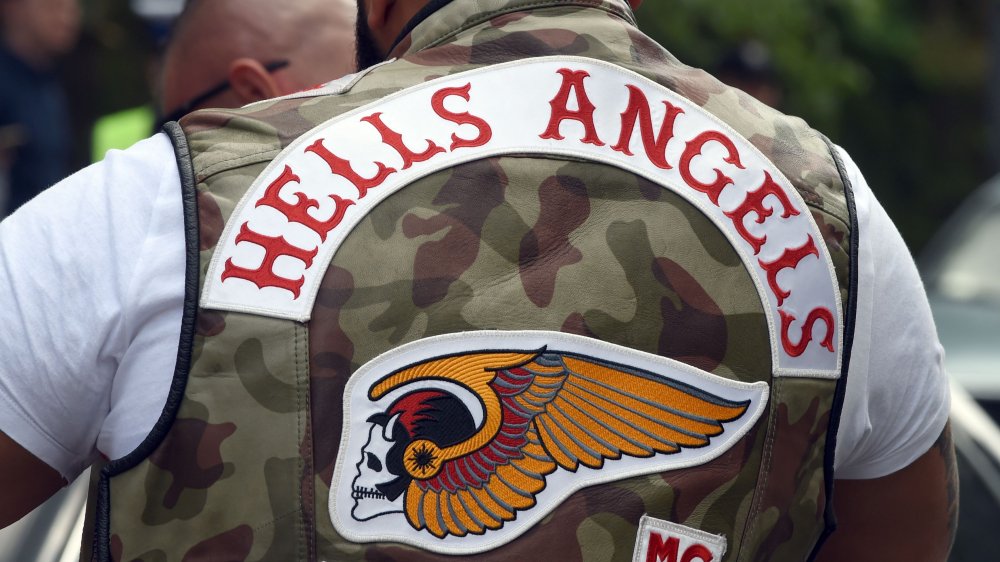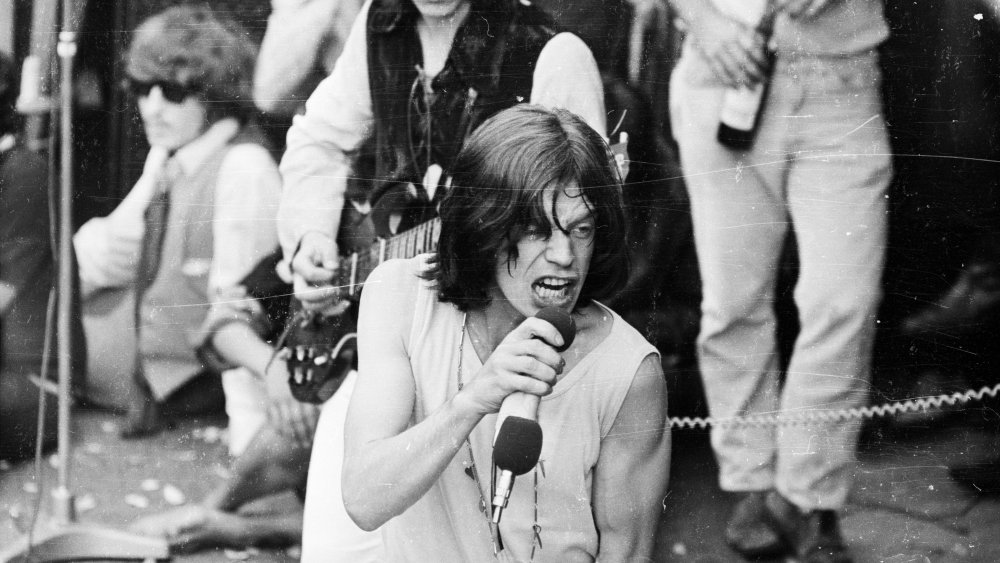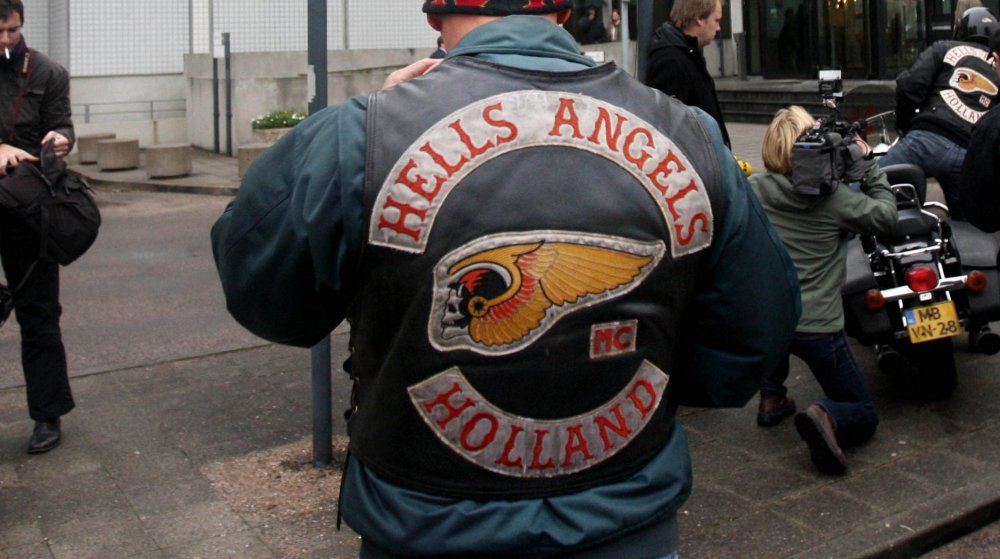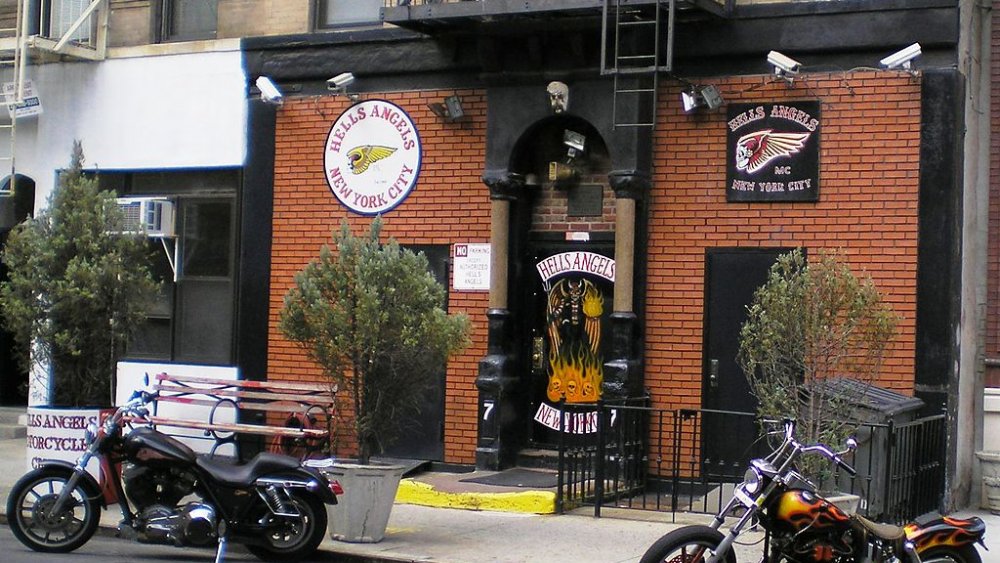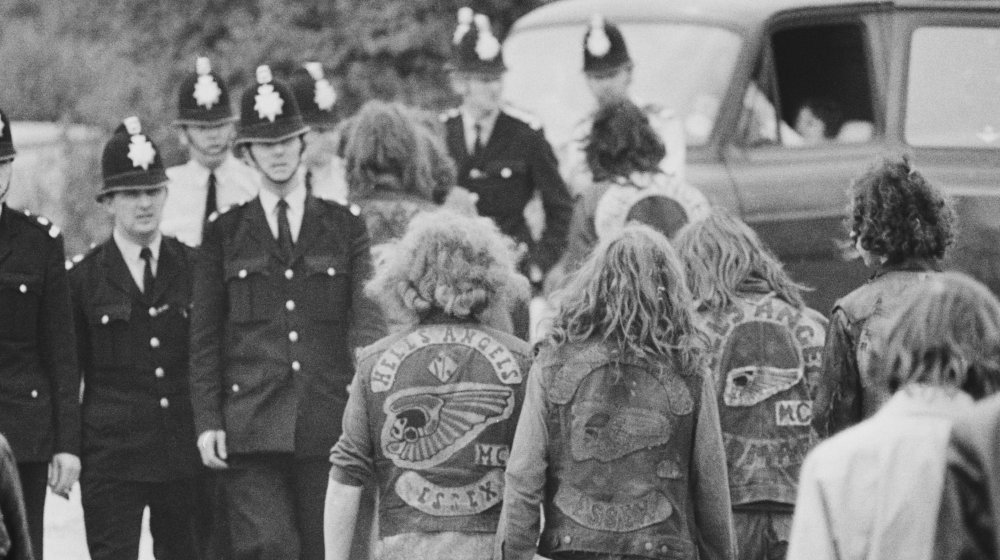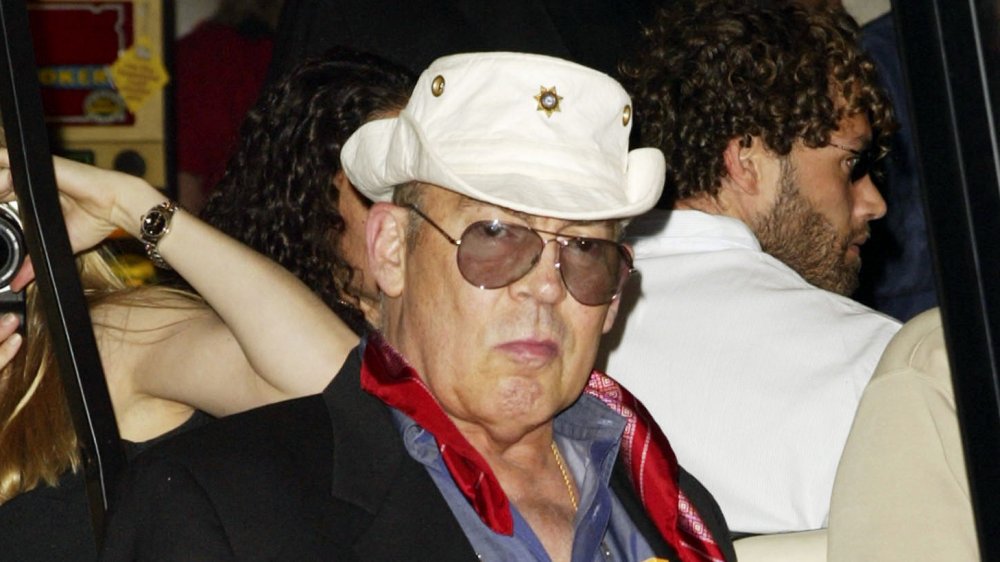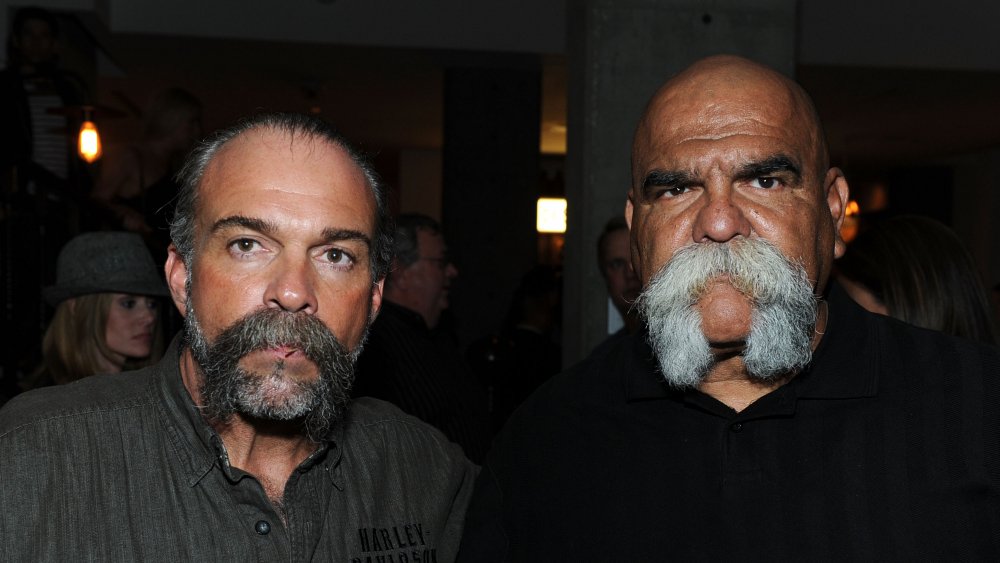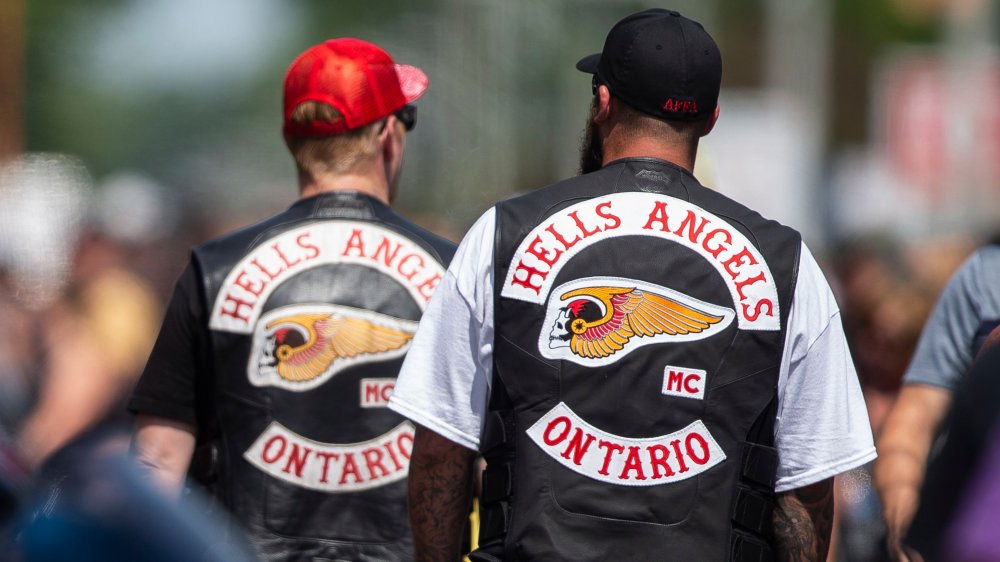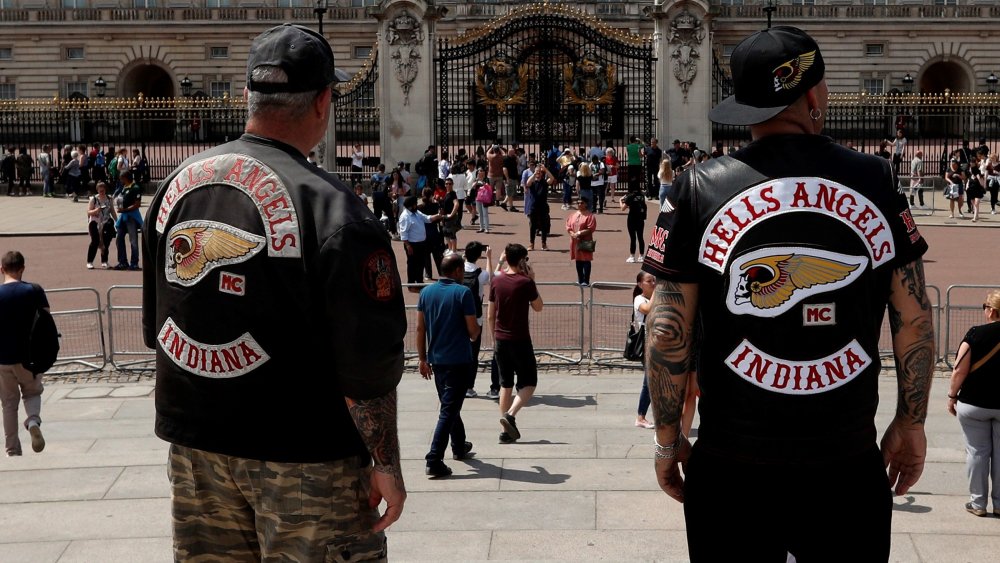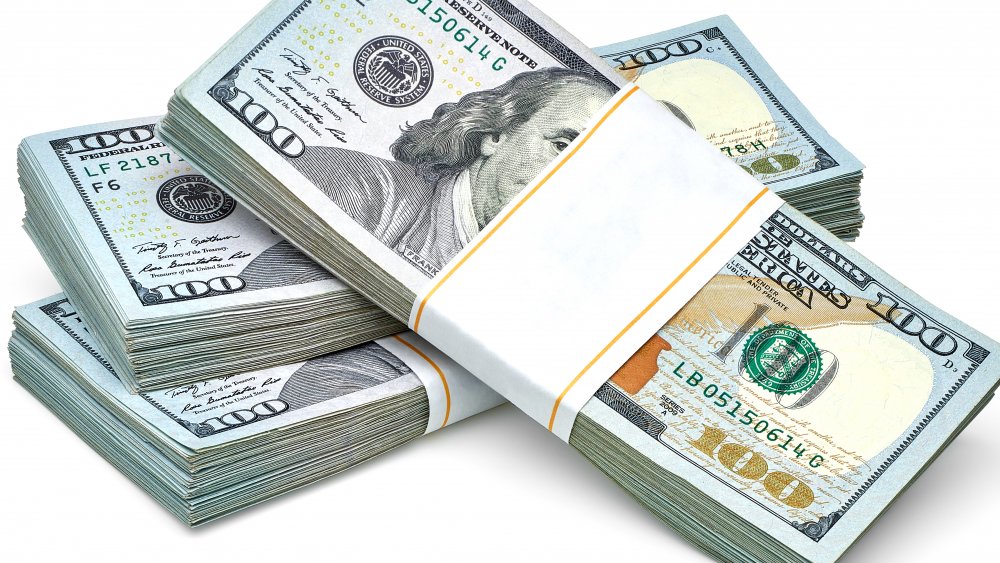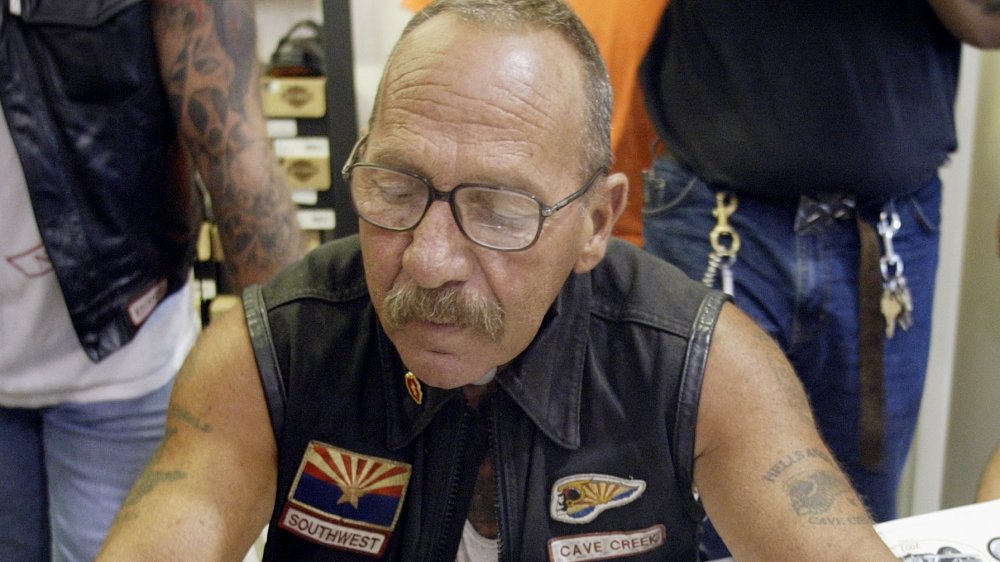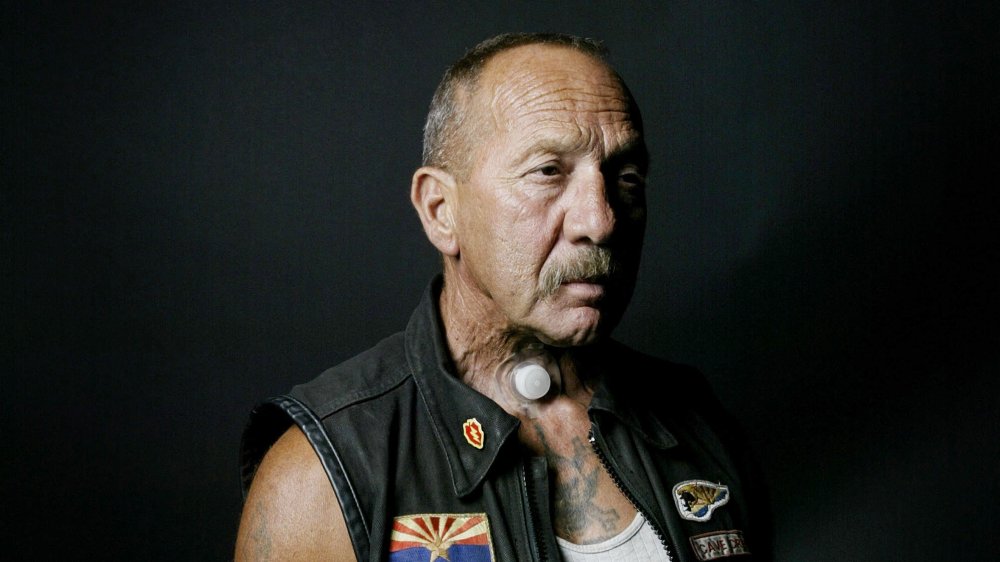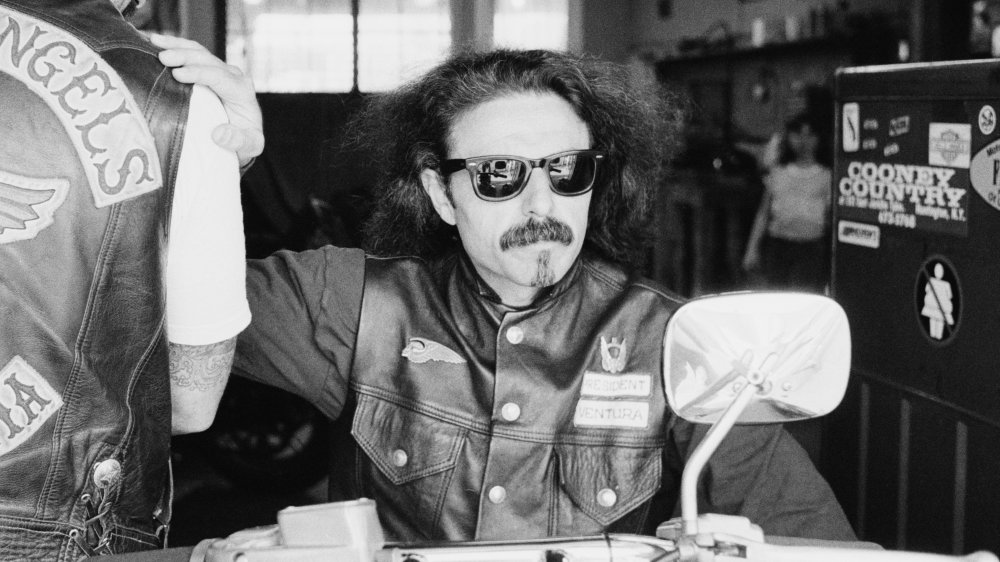The Troubled History Of The Hells Angels
When you think of "outlaw bikers," you most likely think of the Hells Angels Motorcycle Club. (Or maybe you think of the Sons of Anarchy from the show of the same title, but since the Sons were largely modeled on the Angels, it's kind of the same thing.) For decades, the Hells Angels have been symbols of freedom, individualism, and criminality — tough, hard-living guys driving Harley Davidsons and making their living in a variety of sketchy ways.
What a lot of people don't realize is that the Hells Angels were initially formed by groups of military vets returning from service in the 1940s and 1950s, were once noted for their chivalrous and community-positive behavior, and were embraced by the burgeoning counterculture of the 1960s as fellow travelers resisting conformity. But the Hells Angels have suffered a lot of tragic twists and turns in their history that have ruined their reputation and turned them into one of the most dangerous organized crime outfits in the world, even as their cultural influence and membership has slowly ebbed and their founding members have aged and passed away. If you still think of modern-day cowboys riding their bikes when you think of these guys, then here's the troubled history of the Hells Angels.
The Hells Angels and Altamont
One of the most pivotal and tragic moments for the Hells Angels was also a turning point for the counterculture of the 1960s — the killing of Meredith Hunter by Hells Angel Alan Passaro at the Altamont Music Festival on December 4, 1969. The Hells Angels had been welcomed into the counterculture in the 1960s as fellow outcasts, people who had rejected the status quo and were determined to forge their own path, but the Angels weren't hippies by any stretch. As writer Saul Austerliz notes, while the Hells Angels were happy to hang out with rock stars and take their drugs, they were actually much more politically and culturally conservative than most of their new friends.
The Altamont Festival, inspired by Woodstock and poorly organized, sported several Hells Angels as low-cost security muscle (who were supposed to be paid in beer). Hunter had brought a gun with him to the concert because he'd heard about racist attacks. As The New Yorker recounts, after getting into a scuffle with the drunken Angels (who were not so much security by this time as engaged in a slow-boil brawl with the entire audience), Hunter pulled his gun, and Passaro ran over and stabbed him to death while the Rolling Stones played "Under My Thumb," unaware. Whatever reputation the Hells Angels might have enjoyed was instantly poisoned, and the club will forever be remembered for this one terrible moment above all others.
The Hells Angels have been banned by entire countries
Over the course of seven decades, the Hells Angels have spread around the world, opening chapters in many different countries. Their core philosophy of independence and brotherhood has found adherents everywhere, and the club's decentralized structure has made it very easy for it to grow. Unfortunately, as the club grew, so did its reputation for criminality and violence, exacerbated by the rise of rival motorcycle clubs and consequent turf wars.
The tide of history seems to be turning against the Hells Angels, though — as BBC News reports, the Hells Angels were officially banned in the Netherlands in 2019. They're not banned in a city or region in the Netherlands — they're banned from the entire country, via court order that specifically called out the club's culture of violence. In its ruling, the Dutch court said of the club, "The violence is often so serious and causes so much social unrest that it can be considered in contravention of social order." The Netherlands has banned other motorcycle clubs, and this is actually the second time they've tried to ban the Angels. According to The NL Times, prosecutors there tried in 2009, but at that time, the Supreme Court ruled there was insufficient evidence that the club was a criminal organization.
The Hells Angels lost their iconic New York clubhouse
Any global brand needs a presence in Manhattan to be taken seriously — that's why every luxury label in the universe has a store on Fifth Avenue. The Hells Angels are, above all else these days, a brand, so their iconic clubhouse at 77 E. Third Street in New York City was an essential part of their marketing and identity. Purchased in 1969, the Clubhouse has been a controversial part of the neighborhood for years, with some residents regarding the Angels as a colorful part of the authentic New York experience and others despising the bikers for the way they illegally hogged parking spots and intimidated anyone who complained.
The authorities also put a lot of energy into trying to shut down the Clubhouse ... or at least get inside for a good search. According to amNewYork, the FBI first raided the place in 1985, and the city tried to evict the Angels in 1994. None of those strategies worked, but the Club's sudden departure in 2019 after 50 years of tough resistance is symbolic of their decline. Adding insult to injury, they moved to a less expensive spot in the Bronx, but as NBC New York reports, their new neighbors aren't excited to see them — especially after a gunfight broke out there just a few weeks into their tenancy.
A single report made the Hells Angels criminals
How the Hells Angels became an international criminal organization is a real chicken-and-egg question. While there's no doubt that the club's activities were pretty sketchy from the very beginning, in the early years, this was mainly small-time stuff pursued by individual members. The structure of the Hells Angels is a confederacy of individual chapters — they're all under the umbrella of the Hells Angels, but they're independent, at least in theory, so even if one chapter was engaged in criminal activity, it couldn't be blamed on the entire organization.
But in 1964, several Angels were accused of a gang rape in California. They were eventually released due to a lack of evidence, but The New York Times reported that the case caught the attention of State Attorney General Thomas C. Lynch, who launched a six-month investigation into the Angels. As writer Arthur Veno notes, the report he released, eventually known as the Lynch Report, was instrumental in changing the public's perception of the Angels from rough-but-noble outsiders to ominous criminals, despite the fact that many journalists (most notably Hunter S. Thompson, who spent a year following the Angels around) challenged the report's accuracy. The characterization stuck, and after 1964, the Angels found it harder and harder to shake their image as thugs and criminals.
Hunter S. Thompson used the Hells Angels
Today, Hunter S. Thompson is a legendary writer, but in 1964, he was a little-known journalist looking for something to springboard him into success. After the Lynch Report made the club controversial, Thompson pitched a story on them to one of his editors. That pitch turned into Thompson hanging out with the Hells Angels for a year, riding with them and befriending many of them, and resulted in the book Hell's Angels: The Strange and Terrible Saga of the Outlaw Motorcycle Gangs, published in 1966.
That book put Hunter S. Thompson on the literary map (The New York Times gave it a long-form write-up), but he paid a price: As SF Weekly recalled, his last time hanging out with the Angels resulted in a severe beating when Thompson dared to criticize a member who was beating up his wife and dog. Worse, the Angels felt betrayed and used by Thompson, and a founding member of the Oakland chapter, Skip Workman, actually went on television in 1967 to confront Thompson. Workman describes Thompson's book as "60% cheap trash," which accurately reflects how the rest of the Club regarded the writer's work — they clearly felt Hunter S. Thompson had used them to further his own career.
The Mongols instantly became the Hells Angels' violent rivals
When the Hells Angels were banned in the Netherlands, the NL Times reported that the Dutch authorities believed they "present themselves as the largest and most powerful motorcycle club." That's been the case since the foundation of the Hells Angels, and it has doomed them to constant warfare with rival clubs.
Up until 1969, rival motorcycle clubs were either small-time affairs or willingly acknowledged the authority of the Angels, and those rivalries were mainly local and minor affairs. However, as The New York Times notes, in December 1969, the Mongols Motorcycle Club was established. For the first time, the Hells Angels had a formidable rival gang to deal with — and it's been open war ever since.
As The Mercury News reports, the Mongols successfully took the Angels' Southern California territory in the 1980s, and the violent conflict continues to this day. The Los Angeles Times detailed turf wars between the clubs in 2017, and as recently as April 2020, the two clubs clashed violently in Oregon. While it was inevitable that a rival motorcycle club would challenge the Hells Angels, the arrival of the Mongols doomed them to decades of expensive, bloody war.
Getting organized changed the Hells Angels
The Hells Angels may have started off as a motorcycle club for veterans and outsiders, but by the 1970s, under the leadership of Oakland Chapter President (and de facto national leader) Sonny Barger, the Angels were clearly an organized crime outfit. But they were still rough around the edges, and that meant other criminal organizations were wary of working too closely with them. By the 1980s, as journalist André Cédilot says, "The Hells Angels were doing a cleanup to become a real criminal organization. Before that, they were disorganized and unruly. They were like a street gang."
This "cleanup" effort led to what's known as the Lennoxville Purge in Quebec, where the Angels set up a meeting with the Laval Chapter of the club — patched-in, full members of the Hells Angels — and murdered them in cold blood because they were hurting this effort to portray the Hells Angels as professional criminals who could be relied on to watch the bottom line. The ambush was considered shocking by some of the Hells Angels, and rival motorcycle gang the Rock Machine was formed in part as a reaction to what was seen as a betrayal of the outlaw code the Hells Angels had introduced to the world.
The Hells Angels' membership is in decline
The Hells Angels have a lengthy and arduous membership process that can take years to go from being a "hang-around" to a prospect to a full-patch member, and they reportedly reject anyone who has applied for a job in law enforcement or corrections. So it's not too surprising that their membership has never been huge. The Department of Justice estimates that there are at most 2,500 full members of the club worldwide, although that doesn't include the people working through the membership process or those who are trusted associates but not formally members.
What should be worrying the club is their declining membership. For example, MyNorthwest reported that by 2014, the Washington Chapter of the Hells Angels only had eight full members and perhaps a dozen prospects statewide, and CBC News reported in 2017 that the Nova Scotia Angels only had nine active members — one of whom was in jail. Theories on the decline center on the lack of appeal to young military veterans, traditionally the main source of new members for the Hells Angels, and their persistently violent and criminal reputation, which can dissuade folks who might find the idea of an "outlaw" life appealing but have no interest in joining up with an organized crime outfit.
The Hells Angels are more about branding these days
While it's pretty obvious that the Hells Angels are still plenty violent and dangerous, over the years, they've become more and more of an outlaw corporation than an outlaw gang. With membership declining and law enforcement constantly working to curtail their illegal activities, the club has turned to a pretty mainstream revenue channel to stay afloat in the modern era: trademark enforcement.
As intellectual property company Novagraaf notes, the Hells Angels shrewdly established the Hells Angels Motorcycle Corporation (HAMC) and assigned ownership of all its trademarks to the company, which has been pretty active in defending those lucrative trademarks. As The New York Times reports, HAMC has sued a laundry list of corporations over infringement, including Toys "R" Us, Alexander McQueen, Amazon, Saks, Zappos, Walt Disney, and Marvel Comics. This helps protect the mystique of the Hells Angels patches and insignia, of course — but it also keeps control over the sale of other trademarked material in the club's hands.
According to Novagraaf, "As a result of its approach to trademark infringement, the club is building up a reputation for its ability to use and stay within the law." This isn't exactly in line with their "outlaw" image, but not even outlaws can leave money on the table, it seems.
Sonny Barger is a softie
Ralph "Sonny" Barger has been the face of the Hells Angels since the early 1960s, as his Oakland chapter became the de facto center of club business. He's mentioned a lot in Hunter S. Thompson's seminal book Hell's Angels: The Strange and Terrible Saga of the Outlaw Motorcycle Gangs, he was present at Altamont when Meredith Hunter was killed, and he appeared as himself on Sons of Anarchy. Barger has worked hard to maintain a tough image of the outlaw leader, but a few years ago, that image began to crumble when George Christie, a former member and at one time one of the most powerful men in the club, published a memoir.
As The New York Daily News reported, Christie described Barger snitching on his wife to the police and beating up her 14-year old daughter, Sarrah. He also says that Barger suffered what he describes as a nervous breakdown and had to be institutionalized. Christie says he took these issues to the club leadership, but that Barger's influence not only kept him safe from any repercussions but also meant that when Christie tried to peacefully retire from the club, he was categorized as "out bad, no contact" — essentially a dishonorable discharge.
The Hells Angels' leader lost his voice
Ralph "Sonny" Barger has been an almost ideal spokesperson and public face of the Hells Angels since the 1960s. One of the original members of the Oakland chapter that came to dominate the organization, Barger got boosted into the role of overall club leader in part because of the way Hunter S. Thompson depicted him in his famous book: "In any gathering of Hell's Angels ... there is no doubt who is running the show: Ralph 'Sonny' Barger, the Maximum Leader, a six-foot, 170-pound warehouseman from East Oakland, the coolest head in the lot, and a tough, quick-thinking dealer when any action starts."
Barger wasn't just a skilled organizer and crime boss, though — he was a savvy media personality who played up his outlaw status, which is why it was a terrible blow to both Barger and the Hells Angels when he was diagnosed with cancer of the larynx when he was just 44 years old. As the NY Press reported, treatment required surgery which left him with an air hole in his neck and a weakened, raspy voice, which takes away from his tough-guy image.
A high-ranking member flipped on the Hells Angels
Part of the mystique of the Hells Angels is the concept of outlaw brotherhood — members live by a pretty complex code of behavior and shun outsiders, keeping the workings of the Angels mysterious. But just like any other criminal organization, when people become disillusioned — or start to fear for their lives — all that brotherhood can go out the window. In recent years, the Hells Angels have seen some pretty high-ranking members turn traitor. George Christie, who was once one of the most powerful members of the club, retired from the Angels in 2010 and wrote a tell-all book exposing the Club's secrets. Even worse, as Vice reported, Dave "Shaky" Atwell, once sergeant-at-arms of the Angels' downtown Toronto chapter, became the highest-ranking member to ever cooperate with the police, flipping on the club and helping the cops bring a whopping 169 charges against 31 people.
Worse, Atwell detailed in his book The Hard Way Out: My Life with the Hells Angels and Why I Turned Against Them, how "corporate" the Hells Angels are, with mandatory party attendance and endless fees that left him constantly in debt to the Club — not exactly an outlaw image. Atwell's reward to turning on his former brothers? The witness protection program and, as he told Maclean's in 2017, the constant worry that he might be killed when he walks out of his apartment.
